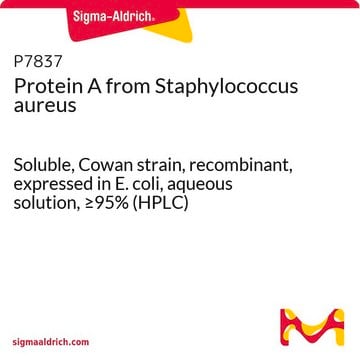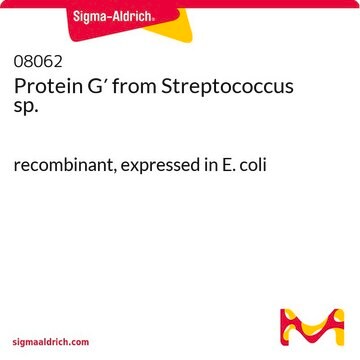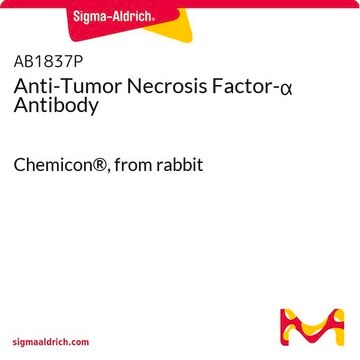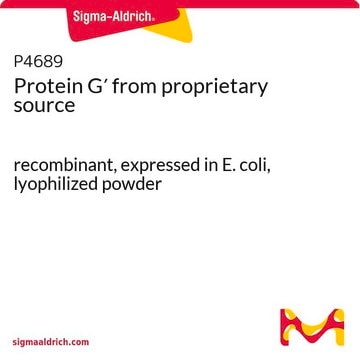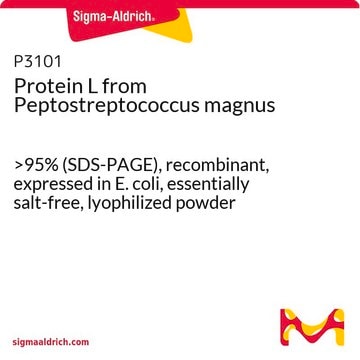Recommended Products
form
lyophilized solid
Quality Level
manufacturer/tradename
Calbiochem®
storage condition
OK to freeze
solubility
water: soluble
shipped in
ambient
storage temp.
−20°C
General description
Native protein A from Staphylococcus aureus. Provides a versatile and economical means for isolating, detecting, and purifying antibodies. It is especially useful in immunohistochemical studies because, unlike secondary antibodies, it does not bind to cell Fc receptors and, therefore, will not give high background reactions. Strongly reactive with guinea pig; human IgG1, IgG2, and IgG4; mouse IgG2b, and rabbit. Weakly reactive with bovine; human IgA, IgE, and IgM; and mouse IgG3. Nonreactive with goat; horse; human IgD and IgG3; rat; mouse IgG1; and sheep.
Warning
Toxicity: Standard Handling (A)
Reconstitution
Following initial thaw, aliquot and freeze (-20°C). Stock solutions are stable for up to 3 months at -20°C.
Other Notes
Sjødahl, J. 1976. FEBS Lett.67, 1976.
Legal Information
CALBIOCHEM is a registered trademark of Merck KGaA, Darmstadt, Germany
Storage Class Code
11 - Combustible Solids
WGK
WGK 1
Flash Point(F)
Not applicable
Flash Point(C)
Not applicable
Certificates of Analysis (COA)
Search for Certificates of Analysis (COA) by entering the products Lot/Batch Number. Lot and Batch Numbers can be found on a product’s label following the words ‘Lot’ or ‘Batch’.
Already Own This Product?
Find documentation for the products that you have recently purchased in the Document Library.
Michael P Schwartz et al.
Analytical chemistry, 79(1), 327-334 (2006-12-30)
Determination of kinetic and thermodynamic protein binding constants using interferometry from a porous Si Fabry-Perot layer is presented. A protein A capture probe is adsorbed within the pores of an oxidized porous Si matrix, and binding of immunoglobulin G (IgG)
Gerard J Nau et al.
Proceedings of the National Academy of Sciences of the United States of America, 99(3), 1503-1508 (2002-01-24)
Understanding the response of innate immune cells to pathogens may provide insights to host defenses and the tactics used by pathogens to circumvent these defenses. We used DNA microarrays to explore the responses of human macrophages to a variety of
Eniko Farkas et al.
Biosensors, 12(2) (2022-02-25)
Bacteria repellent surfaces and antibody-based coatings for bacterial assays have shown a growing demand in the field of biosensors, and have crucial importance in the design of biomedical devices. However, in-depth investigations and comparisons of possible solutions are still missing.
Viktoria Rungelrath et al.
Microbiology spectrum, 9(2), e0088821-e0088821 (2021-10-28)
Staphylococcus aureus is an important human pathogen that can cause a variety of diseases ranging from mild superficial skin infections to life-threatening conditions like necrotizing pneumonia, endocarditis, and septicemia. Polymorphonuclear leukocytes (PMNs; neutrophils in particular herein) are essential for host
Ronan M Kelly et al.
Biotechnology and bioengineering, 115(3), 705-718 (2017-11-19)
Cross-linking of the Fcγ receptors expressed on the surface of hematopoietic cells by IgG immune complexes triggers the activation of key immune effector mechanisms, including antibody-dependent cell mediated cytotoxicity (ADCC). A conserved N-glycan positioned at the N-terminal region of the
Our team of scientists has experience in all areas of research including Life Science, Material Science, Chemical Synthesis, Chromatography, Analytical and many others.
Contact Technical Service
